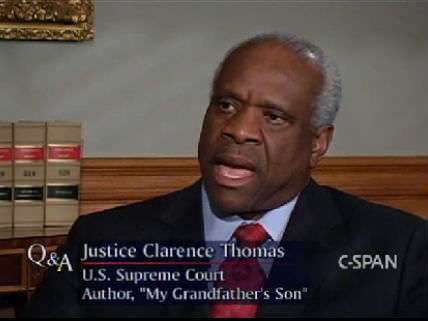Clarence Thomas Castigates SCOTUS for Showing 'Insufficient Respect' to State Laws and State Constitutions
The conservative justice dissents from denial of certiorari in County of Maricopa v. Lopez-Valenzuela
Last year the U.S. Court of Appeals for the 9th Circuit struck down an Arizona voter initiative which amended the state constitution in order to render all undocumented immigrants charged with "serious felony offenses" ineligible for bail in the state's criminal justice system. Arizona's "unusual, sweeping pretrial detention" restrictions, the 9th Circuit held, "represent a 'scattershot attempt' at addressing flight risk and are not narrowly tailored to serve a compelling interest." The Arizona constitutional amendment was therefore ruled unconstitutional by the federal court.
Not surprisingly, Arizona appealed its loss. Yesterday morning, the U.S. Supreme Court declined to hear the state's case. Because the 9th Circuit's ruling was allowed to stand, Arizona's no-bail amendment was made null and void.

End of story? Not quite. In an unusual maneuver, Justice Clarence Thomas filed a sharp dissent attacking his colleagues for their failure to weigh in on the matter. "The Court's refusal to hear this case shows insufficient respect to the State of Arizona, its voters, and its Constitution," Thomas charged.
His dissent proceeded along two lines. First, Thomas left little doubt that he believes the Arizona amendment should have been upheld and the 9th Circuit overturned. The Supreme Court's silence, he wrote, "suggests to the lower courts that they have free rein to strike down state laws on the basis of dubious constitutional analysis."
Second, and much more significantly, Thomas accused his colleagues of failing to do their judicial duty. "It is disheartening that there are not four Members of this Court who would even review the decision below," he wrote. It takes a minimum of four votes for the Court to agree to hear a case.
Thomas' principal complaint is that the Supreme Court is treating the states worse than it treats Congress. "States deserve our careful consideration when lower courts invalidate their constitutional provisions," he maintained. "After all, that is the approach we take when lower courts hold federal statutes unconstitutional."
In other words, when Congress enacts a statute and a lower court decides to strike it down, the Supreme Court agrees to hear the federal government's appeal, even if the justices ultimately conclude that the federal statute deserved to be struck down. Thomas wants the states to receive equal treatment at SCOTUS. "We should show at least as much respect for state laws," Thomas wrote, "as we show for federal laws."
Justice Thomas' dissent from denial of certiorari in County of Maricopa v. Lopez-Valenzuela is available here.


Show Comments (20)